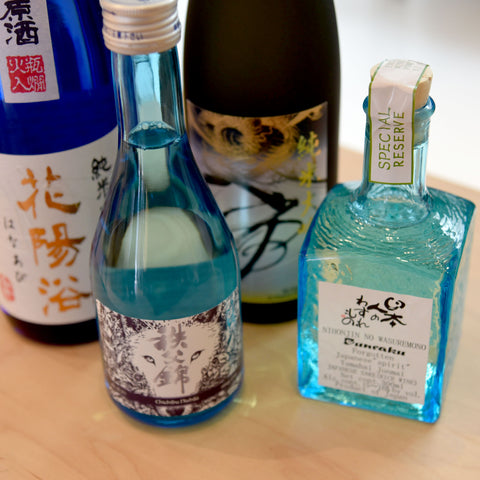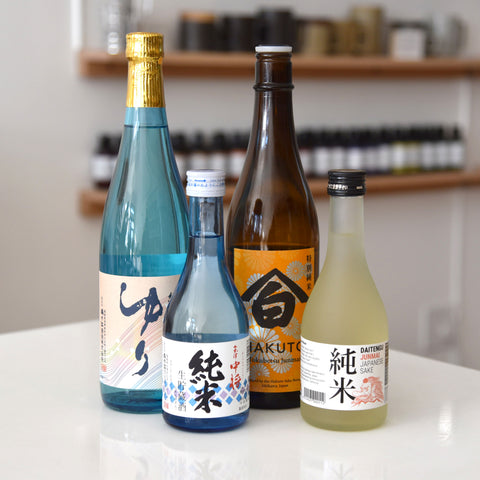Shochu Gumi is our monthly sake subscription service with 70 members throughout the country. Join today!
Welcome to the first edition of Female Frontrunners for Shochu Gumi! This is a theme that is dear to us at Umami Mart, as a women-led company: Yoko has been featuring women for the last six years of Sake Gumi, to coincide with Girl’s Day in Japan and International Women’s Day, both in March. We also take the opportunity to feature women makers in our shop – from tea and homewares to wellness products. It’s not just a myth: even in 2022, it’s hard to find women in any industry, and it brings us great joy to celebrate all the Female Frontrunners of Umami Mart.
Yoko tells us that there are only 3% of women-led sake breweries in Japan, and while I couldn’t track down a percentage of female-run shochu distilleries, one can surmise that it’s a dismal number. With that said, I was able to find us two extremely special shochus this month, both made by women-led companies. You are in for a treat!
Masako Furusawa grew up in her family’s Furusawa Distillery in Miyazaki, where her grandmother and mother both worked tirelessly. She is now the fifth generation president, and thinks that it is natural for women to be a part of their company since they have been involved in the business since the end of the war. She recalls her grandmother telling her, “Make us hear your footsteps,” meaning she should devote her energy to the workings of the distillery and making shochu with care.
 Masako Furusawa of Furusawa Distillery
Masako Furusawa of Furusawa Distillery
Director of Nishiyoshida Shuzo Kyoko Yoshida, who also grew up in her family distillery in Fukuoka, told me that women were banned from sake and shochu-making during the Edo period. Today, Yoshida thinks that women hold a vital role in the company, especially during the bottling stages, due to their attention to detail. Thanks to this, she says, “we can ship bottles with peace of mind.”
 Kyoko Yoshida of Nishiyoshida Shuzo
Kyoko Yoshida of Nishiyoshida Shuzo
Both women mentioned that the automation of shochu making has helped more women enter the shochu workforce – something that is also true for the sake industry. Furusawa says no one now believes that, "women are inferior to men.” And with that, both women move forward as leaders in the shochu industry, committed to making shochu that will bring happiness.
Kanpai,
Kayoko
Co-Founder and Shochu Director, Umami Mart

Ark Jakuunbaku Shochu
Nishiyoshida Shuzo (Chikugo, Fukuoka)
Distilled from 100% mugi (barley)
ABV 25% / Koji: Black / Distillation: Atmospheric / Age: 2-5 years in enamel tanks
The name Jakuunbaku is a word play on a tantra by Aizen Myo, a Buddhist wisdom king. Aizen Myo is known for passion and connection between people, thus, Nishiyoshida hopes to connect to people with this shochu. Ark refers to Dainichi Nyorai, the sun Buddha.

Tanks at Nishiyoshida Distillery
Using underground water from the local Hamuname River, nijo barley from Australia, and black koji, Ark Jakuunbaku is made in the muroka (unfiltered) style. Get a spectrum of flavor: dried apricots, honey, and brownies – and even some spicy black peppercorns and nutmeg.
 Yoshida's grandmother and employees of the distillery
Yoshida's grandmother and employees of the distillery
Enjoy on the rocks or oyuwari (with hot water) to bring out the milk chocolate notes. Yoshida, who specializes in food and nutrition, has provided us with a few recipes like nikumiso (meat miso dip) and more. Check them out on the blog!
Motoko “A Mother’s Legacy” Shochu
Furusawa Distillery (Nichinan, Miyazaki)
Distilled from 100% long grain Thai rice
ABV 35% / Koji: White / Distillation: Atmospheric / Age: 9 years in ceramic + enamel
We are so lucky to have this shochu stateside, from the famed Furusawa Distillery, which resides in the same building from when they opened in 1892! Furusawa occupies the only dozo building in Miyazaki for shochu-making, an old architectural style of mud walls and timber, and the family also lives there.
 Koji room at Furusawa Distillery
Koji room at Furusawa Distillery
President and toji Masako Furusawa of the distillery is the eldest of three sisters. When I asked what her favorite part of shochu-making is, she replied, “The sounds of the boiler, the smell of steamed rice, the warmth and aroma of koji, the sounds and smells of the moromi, the bubbling sounds of distillation, and the smell as it drips o the still.”
 Moromi at Furusawa Distillery
Moromi at Furusawa Distillery
Made with an endless amount of attention and care, the moromi is fermented in unglazed earthenware vats, and the carefully selected ingredients are distilled one pot at a time using hereditary know-how. Motoko is named after Fususawa’s grandmother; in this bottle, you’ll get a bevvy of flavors, from grape to tay to strawberry and shishito, yet notice a surprising minerality. I really enjoyed this on the rocks with some water, or with soda, alongside a plate piled high with anchovy pasta. Furusawa also recommends the drink with gyoza or duck hot pot.



Comments (0)
There are no comments for this article. Be the first one to leave a message!